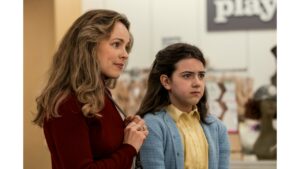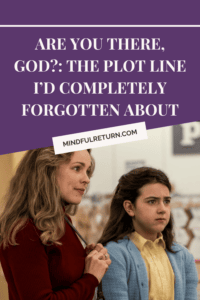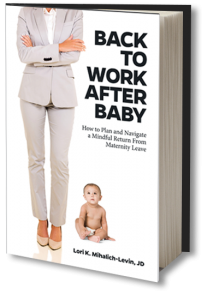 Early this past summer, I went to see “Are You There God? It’s Me, Margaret” in the movie theater. One of the story’s sub-plots – one I’d completely forgotten about from the book – shook me to my core as a parent and as a daughter.
Early this past summer, I went to see “Are You There God? It’s Me, Margaret” in the movie theater. One of the story’s sub-plots – one I’d completely forgotten about from the book – shook me to my core as a parent and as a daughter.
A few weeks later, after the end-of-school craziness had died down in June and I had processed the feelings from my movie-going experience a bit, I wrote the story below. I will share with you that I tried hard to get it published in a bunch of places. But to no avail. While I received heaps of positive feedback, the clear and consistent message was: “You’ve missed the boat. Had you sent us this piece before the Barbenheimer craze hit, we’d have published it. Next time, send us something before the movie comes out.”
Um, not sure about all you working parents out there, but I’m lucky to see a movie (period!). Let alone in a theater, much less in some sort of pre-screening. So reflecting on this movie in a pre-release timeframe wasn’t going to have been an option. That I found time to put words on paper at all while juggling camps and kids and life was a big deal. And getting rejection after rejection after rejection stung.
In our Mindful Return courses, we have a mantra that “There is no such thing as ‘late’ in Mindful Return land.” In that spirit – and in the spirit of reflection, presence, and gratitude that I am working to bring to the Jewish High Holy Days that are currently upon us – I offer you here on my own blog the piece I wrote a few months ago.
I invite you to time travel a few months to earlier this summer when this movie came out. (And if you haven’t seen it yet, it’s worth watching.)
************************************
Decades and decades ago, in a tent that was pitched for I have no idea what reason in the back yard of my house in Pennsylvania, I hid and read Judy Blume’s Are You There God? It’s Me, Margaret. I remember the feel of the glossy dust cover protector on that West Shore Public Library chapter book. The smells of all the other hands that had touched this intriguing novel. And the knowing, without being able to articulate why, that I needed to read it in secret.
Fast forward about thirty years, and I found myself face to face with this story again. Though this time, I wasn’t hiding. Or in control of the speed of the pages I turned. I wasn’t observing little words on a page, protected by a big tent. No, this time, I was out in public, head tilted toward the big screen. In a cozy, reclining theater chair. Giddy to be kid-free for the evening and out at a movie with two close mom friends.
I hadn’t thought about this book in ages. But when the lights dimmed, and the story began, my mind flashed back to its themes of coming of age. Periods. Breasts. And friend struggles. “Ah, I’m in for a fun ride down memory lane,” I smiled to myself. Which was true, until it wasn’t. Until that second plot line came along. One I had forgotten about completely.

As the movie begins, we learn that Margaret, the young main character, is enduring the trials of moving from New York City to New Jersey. We also learn that her dad is Jewish and her mom isn’t. Her Jewish grandmother, who also lives in New York, is extremely involved in her life (and truly believes she might perish with Margaret’s departure). Margaret’s mother’s parents aren’t in the picture.
At some point, Margaret wants to know what the deal is with her maternal grandparents. It’s likely a question that’s come up before (we don’t know but can assume). And her mom probably figures she’s old enough to handle the truth now. Barbara Simon, Margaret’s devoted and empathetic mother, explains, with deep sadness, that her parents walked out of her life when she decided to marry someone Jewish.
Boom. There it was. Mother of a tween. Whose parents couldn’t accept her for marrying someone who wasn’t Christian. An orphaned adult. Raising children without the support of her own parents. This was me.
Big, fat tears welled up in my eyes, and started to stream uncontrollably down my cheeks. But I wasn’t crying alone. Rachel McAdams (as Barbara Simon) was weeping too. Right up there on the big screen. And the friend sitting next to me grabbed my hand.
God, Rachel McAdams did such a freaking amazing job of portraying the anguish of having to explain to a child why they never met a grandparent. Of reflecting the quandary of marrying someone you love wholeheartedly, but having others in your life reject you for it. My position. From her character’s indecision about whether to send her parents a holiday card. To her hands that shook, and pain in her eyes as she put the card quickly into the envelope. McAdams’ representation of Margaret’s mom was exquisitely portrayed. Spot on.
And when the brilliant Abby Ryder, playing Margaret, hugged her mama and offered some version of “I don’t understand why anyone would do that to their child. You’re the best mom in the world. I love you, and I don’t get it,” I felt like my own child was speaking to me.
As the film concluded, my torrents of tears wouldn’t stop. I hadn’t cried this much since I don’t know when. My friends and I stayed, squeezing hands in the dark theater until the last credit rolled. And when I looked at myself in the bathroom mirror afterward, my red face and puffy eyes startled me a bit. I pulled my hat a bit lower down my forehead.
Was it sadness that caught me so off guard? A little bit, perhaps. But I think my massive emotional response had much more to do with cathartic relief. YES. That was ME. That is exactly what it feels like to have a parent you thought would believe in you forever, simply walk out. In the name of religion. Or God. Or whatever.
This story was public, and open, and raw, and beautiful. My rush of relief was in feeling like something I’d been hiding was suddenly okay to share. My friends already know this story about my life, yes. They were there to see me walk myself down the aisle of my wedding, no parents there to celebrate this joy. But I’ve largely hidden the details from my public-facing writing and speaking world.
Seeing this movie led me to ask: What if I don’t need to hide my story? What if there’s no one I need to protect in its telling? What if I no longer need to attach shame to this rejection? Or try to protect myself?
I watched this movie around the time of Pride month, and this essay is in a way my own coming out of sorts.
If a family member has rejected you based on the person you love, I see you. If you’ve ever trembled and fumbled, in explaining a difficult family relationship to your children, I see you. And if you’ve chosen love and moved forward regardless, I see you. I am you.
If I could go back and sit with that little redheaded girl in the tent in Pennsylvania, I’d hug her so tightly. I’d tell her to always choose love. That she could never really be broken, although it might feel like it at times. That family can be created and chosen. And that one day, as a 42-year old adult, she would be legally adopted by the most amazing, beautiful, and generous adopted parents. (Yes, that last part is true…a beautiful story for another day.)
My plea to you after my experience watching the Are You There, God? movie is to share your hard thing. Please. Tell the story you think you can’t tell. Let people into the pain, the joy, and all of the crazy.
Because when someone else sees themselves in your story, that feeling of being seen is everything. Absolutely everything.
Thank you, Judy Blume and Rachel McAdams, for doing that for me.
Want more practical tips on working parenthood? Check out my book, Back to Work After Baby: How to Plan and Navigate a Mindful Return from Maternity Leave



This really struck a cord. I haven’t spoken to my mother in 17 years. Mothering without a mother is so hard and it’s not something I talk about a lot.
Oh, Maria. Thank you for sharing that. I hear you and feel your pain. Thank you for saying something here, and please know you’re not alone in this.
Wow, Lori. Thank you for sharing this chapter of your personal story. I can’t imagine anyone rejecting you.
When you are ready, I would love to read more.
Thank you for your kind words, Benta. I am touched and look forward to sharing more soon.
Thank you for sharing your story. Thinking of you.
Good to hear from you, Bobbie, and you are most welcome. Thank you for your comment! Best, Lori